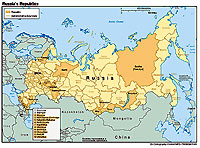Reform or not reform
Business New Europe - bne.com - 3.5.12 - JRL 2012-41
With Putin as expected taking a landslide victory into his six year presidency, analysts are divided over whether this means reform or stagnation, and what impact the emerging opposition movement will have on policy.

file photIn our view, Putin now faces significant challenges in changing a system which he helped to create. The country needs significant structural and institutional reforms, a clampdown on rampant corruption and a reduction in oil dependency," writes Aton brokerage's Peter Westin in a research note.
According to Westin, Russia could face a 'revolution of rising expectations' — people's salaries far faster than they ever imagined possible up to 2008, -30% per year in nominal terms — lending Putin rockstar popularity. But people are ungrateful and expectations adjust to new realities, and so the slowdown in growth following 2008 means now that post-2008 salary growth has been well below what the population had come to expect. "Given that the economic outlook is less than rosy, we believe Russia cannot afford to increase wages dramatically this time around, so unless the population lowers its expectations there is a threat that public discontent could grow."
Westin's gloomy view is that Putin will be unable to push through necessary reforms, leaving Russia dependent on external factors, especially the oil price.
Alfa Bank's Natalia Orlova believes on the other hand that the election victory could boost reforms while opening up politics. "This victory in the first round should reassure Putins confidence in his current plans, which lowers the risk of tightening the economic course toward a sterner dirigisme," she writes in a research note. "Even though observers reported cases of vote rigging and a large street protest against the election results are scheduled for today in Moscow and other cities, we believe Putins strong victory will allow the authorities to be more tolerant of the rallies."
Uralsib analysts are also expecting large protests against the conduct of the vote. "The key issue in this first post-election week will be how the protests play out," writes Slava Smolyaninov. "If they are bloodless and the authorities let people protest in a similar manner to in the run up to the elections, then investors focus will shift to the new governments composition and agenda. Arguably, the government will be in a strong position to introduce and implement institutional changes and reforms needed for the Russian economy to move ahead."
Reform or no reform, VTB Capital analysts are expecting a stock market surge on the back of the result. "Out of the four previous episodes (election victories -bne), on three occasions Russian stocks posted new highs within six weeks of the elections."
Keywords: Russia, Government, Politics - Russia, Economy - Russia News - Russia
With Putin as expected taking a landslide victory into his six year presidency, analysts are divided over whether this means reform or stagnation, and what impact the emerging opposition movement will have on policy.

file photIn our view, Putin now faces significant challenges in changing a system which he helped to create. The country needs significant structural and institutional reforms, a clampdown on rampant corruption and a reduction in oil dependency," writes Aton brokerage's Peter Westin in a research note.
According to Westin, Russia could face a 'revolution of rising expectations' — people's salaries far faster than they ever imagined possible up to 2008, -30% per year in nominal terms — lending Putin rockstar popularity. But people are ungrateful and expectations adjust to new realities, and so the slowdown in growth following 2008 means now that post-2008 salary growth has been well below what the population had come to expect. "Given that the economic outlook is less than rosy, we believe Russia cannot afford to increase wages dramatically this time around, so unless the population lowers its expectations there is a threat that public discontent could grow."
Westin's gloomy view is that Putin will be unable to push through necessary reforms, leaving Russia dependent on external factors, especially the oil price.
Alfa Bank's Natalia Orlova believes on the other hand that the election victory could boost reforms while opening up politics. "This victory in the first round should reassure Putins confidence in his current plans, which lowers the risk of tightening the economic course toward a sterner dirigisme," she writes in a research note. "Even though observers reported cases of vote rigging and a large street protest against the election results are scheduled for today in Moscow and other cities, we believe Putins strong victory will allow the authorities to be more tolerant of the rallies."
Uralsib analysts are also expecting large protests against the conduct of the vote. "The key issue in this first post-election week will be how the protests play out," writes Slava Smolyaninov. "If they are bloodless and the authorities let people protest in a similar manner to in the run up to the elections, then investors focus will shift to the new governments composition and agenda. Arguably, the government will be in a strong position to introduce and implement institutional changes and reforms needed for the Russian economy to move ahead."
Reform or no reform, VTB Capital analysts are expecting a stock market surge on the back of the result. "Out of the four previous episodes (election victories -bne), on three occasions Russian stocks posted new highs within six weeks of the elections."